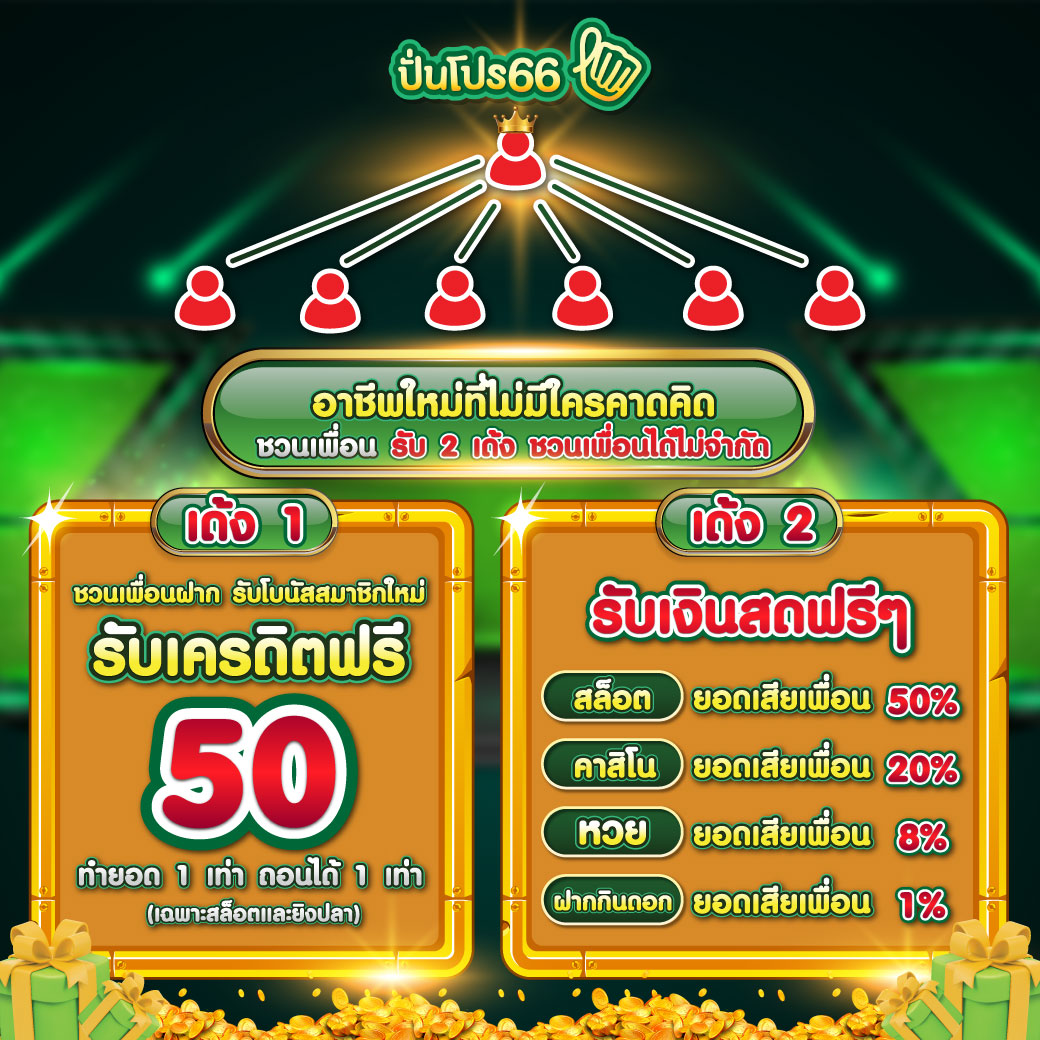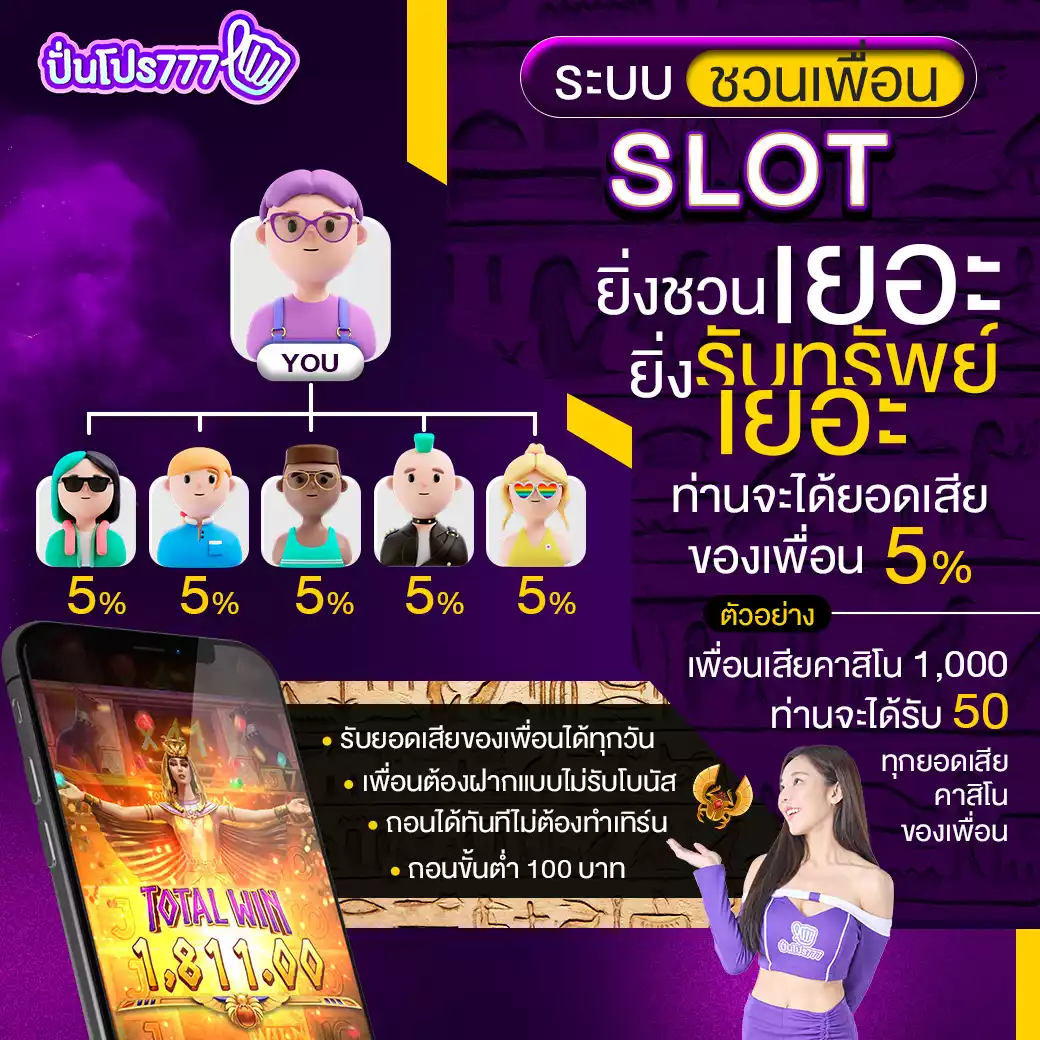เกมสล็อต โจ๊กเกอร์123 จุดหมายของใครหลายๆคนในโลกที่เกมออนไลน์
 หนึ่งในเหตุผลหลักที่ทำให้เกมสล็อต joker123th กลายเป็นที่นิยมอย่างล้นหลามเป็นความสะดวกสบายสำหรับการเข้าถึง ไม่ว่าคุณจะอยู่ที่ไหนก็สามารถเข้าเล่นเกมได้โดยไม่มีความยุ่งยาก ด้วยเทคโนโลยีที่นำสมัย เกม Joker123 มีให้บริการผ่านทางอุปกรณ์โทรศัพท์มือถือรวมทั้งคอมพิวเตอร์ ทำให้ท่านสามารถเข้าเล่นได้ทุกที่ทุกเวลาสามารถทำได้โดยง่าย ไม่ต้องลังเลหรือมีข้อจำกัดใดๆก็ตามที่จะขัดขวางคุณได้
หนึ่งในเหตุผลหลักที่ทำให้เกมสล็อต joker123th กลายเป็นที่นิยมอย่างล้นหลามเป็นความสะดวกสบายสำหรับการเข้าถึง ไม่ว่าคุณจะอยู่ที่ไหนก็สามารถเข้าเล่นเกมได้โดยไม่มีความยุ่งยาก ด้วยเทคโนโลยีที่นำสมัย เกม Joker123 มีให้บริการผ่านทางอุปกรณ์โทรศัพท์มือถือรวมทั้งคอมพิวเตอร์ ทำให้ท่านสามารถเข้าเล่นได้ทุกที่ทุกเวลาสามารถทำได้โดยง่าย ไม่ต้องลังเลหรือมีข้อจำกัดใดๆก็ตามที่จะขัดขวางคุณได้
 เมื่อกล่าวถึงเกมสล็อตออนไลน์ เปลี่ยนเป็นการเกิดใหม่ที่คนคนไม่ใช่น้อยเผลอไผลรวมทั้งติดใจอย่างยิ่ง แม้ว่ามันจะเป็นเพียงเกมสล็อตในโลกออนไลน์ แต่ว่า joker123 ได้สร้างความได้รับความนิยมแล้วก็ความเพลิดเพลินสุดพิเศษให้กับผู้เล่นอย่างไม่น่าเชื่อ ซึ่งมีเหตุมีผลอะไรบ้างที่ทำให้เกมนี้กลายเป็นเจ้าของหัวใจแห่งนักเล่นการพนันทั้งโลก
เมื่อกล่าวถึงเกมสล็อตออนไลน์ เปลี่ยนเป็นการเกิดใหม่ที่คนคนไม่ใช่น้อยเผลอไผลรวมทั้งติดใจอย่างยิ่ง แม้ว่ามันจะเป็นเพียงเกมสล็อตในโลกออนไลน์ แต่ว่า joker123 ได้สร้างความได้รับความนิยมแล้วก็ความเพลิดเพลินสุดพิเศษให้กับผู้เล่นอย่างไม่น่าเชื่อ ซึ่งมีเหตุมีผลอะไรบ้างที่ทำให้เกมนี้กลายเป็นเจ้าของหัวใจแห่งนักเล่นการพนันทั้งโลก
ไม่เพียงแค่ความสบายสบายสำหรับเพื่อการใช้งาน แม้กระนั้นเกมสล็อต โจ๊กเกอร์123 ยังมอบประสบการณ์การเล่นที่น่าตื่นเต้นและก็สนุกสุดขีดให้กับผู้เล่นอีกด้วย ด้วยกราฟิกที่สวยสดงดงามแล้วก็เสียงที่เหมือนจริง คุณจะได้สัมผัสกับการเล่นเกมออนไลน์ที่ไม่มีใครเหมือน ไม่ว่าจะเป็นเกมสล็อตแบบคลาสสิกหรือเกมที่มีโบนัสเยอะแยะ คุณสามารถกล่าวโทษสนุกได้ในแต่ละรอบของการเล่น ทำให้ท่านติดใจแล้วก็อยากกลับมาเล่นอีกรอบอย่างไม่ต้องสงสัย
เกมสล็อต โจ๊กเกอร์123 เป็นเกมที่มีความนิยมและเป็นที่รู้จักในวงกว้างของผู้เล่นเกมออนไลน์ ด้วยความสะดวกสบายสำหรับในการใช้งานและประสบการณ์การเล่นมันไม่ใช่เรื่องแปลกที่เกมนี้ได้รับความนิยมแล้วก็ความสนใจอย่างต่อเนื่อง ถ้าเกิดคุณกำลังมองหาประสบการณ์การเล่นเกมออนไลน์ที่บันเทิงใจสุดไม่ว่าจะเป็นในเรื่องของความสะดวกสบายหรือความมันส์จากการเล่น ไม่ควรพลาดเกมสล็อต Joker123 แน่ๆ
เล่นเกมค่าย โจ๊กเกอร์123 ด้วยระบบใหม่ล่าสุด ปี 2024
เอาอกเอาใจคู่รักความสนุกสนาน มาสัมผัสประสบการณ์การเล่นเกมค่ายสล็อตโจ๊กเกอร์ด้วยระบบใหม่ล่าสุดในปี 2024 การเล่นเกมค่ายสล็อตโจ๊กเกอร์เป็นเยี่ยมในประสบการณ์การเดิมพันออนไลน์ที่หลายคนจำเป็นต้องลองกันอย่างแน่นอน เกมนี้ไม่เฉพาะแต่มีความสนุกสนานสุดเหนือระดับ แม้กระนั้นยังมอบโอกาสสำหรับการชนะเงินรางวัลใหญ่อย่างไม่น่าเชื่อ ด้วยระบบใหม่ปัจจุบันที่เข้ามาเปลี่ยนวงการการเดิมพันในปี 2024 นี้ เล่นเกมค่ายสล็อตโจ๊กเกอร์ในปีนี้เป็นประสบการณ์ที่ไม่สมควรพลาดสำหรับนักพนันทุกคน
ระบบใหม่ล่าสุดในเกมค่ายสล็อตโจ๊กเกอร์123
ในปี 2024 นี้ เกมค่าย โจ๊กเกอร์123 ได้มีการพัฒนาและก็แก้ไขระบบใหม่อย่างต่อเนื่อง เพื่อผู้เล่นได้สัมผัสประสบการณ์การเล่นที่เยี่ยมที่สุด ระบบใหม่นี้มาพร้อมกับความรู้ความเข้าใจสำหรับการเล่นที่เหมือนจริง กราฟิกที่ล้ำหน้า และเทคโนโลยีที่ทันสมัย ทำให้ผู้เล่นสามารถเพลิดเพลินเจริญใจไปกับการเล่นได้อย่างไม่มีข้อจำกัด
ด้วยระบบใหม่ปัจจุบันในเกมค่ายสล็อตโจ๊กเกอร์ ผู้เล่นจะได้สัมผัสประสบการณ์การเล่นที่น่าเร้าใจรวมทั้งเป็นเอกลักษณ์อย่างไม่ต้องสงสัย ไม่ว่าจะเป็นการเล่นเกมสล็อตแบบคลาสสิกหรือเกมที่มาพร้อมทั้งโบนัสมาก เมื่อใดก็ตามเล่น ราวกับคุณกำลังเดินทางผ่านโลกในเรื่องของความเพลิดเพลินยอดเยี่ยม
ปั่นสล็อตกับ joker123 บันเทิงใจได้ไม่จำกัดกับเว็บสล็อตใหม่ล่าสุด
เริ่มปั่นสล็อตกับ joker123 โจ๊กเกอร์123 ที่เป็นเว็บไซต์สล็อตใหม่ปัจจุบันที่จะทำให้ท่านหลงเสน่ห์ เว็บสล็อตใหม่ที่พร้อมสร้างการเกิดใหม่ในแวดวงการเดิมพันออนไลน์โจ๊กเกอร์123 เป็นเว็บไซต์สล็อตใหม่ที่จัดเตรียมที่จะสร้างการปรากฏใหม่ในแวดวงการพนันออนไลน์ ด้วยระบบเกมที่ทันสมัยและก็กราฟิกที่งาม ทำให้ผู้เล่นได้สัมผัสประสบการณ์การเล่นสล็อตที่ไม่เหมือนใคร เกมที่มากับโบนัสมากมายก่ายกอง เมื่อใดก็ตามปั่นสล็อตกับ โจ๊กเกอร์123 คุณจะได้รับความเพลิดเพลินสุดฤทธิ์และรับประกันว่าจะตกหลุมรักสำหรับการเล่นเกมนี้แน่ๆ
นอกเหนือจากประสบการณ์การเล่นสล็อตที่ไม่ซ้ำใครแล้ว joker123 ยังมีระบบระเบียบการเงินที่ปลอดภัยและก็รวดเร็วอีกด้วย ทำให้ผู้เล่นสามารถทำรายการฝาก-ถอนได้ตลอดระยะเวลาโดยไม่มีปัญหาใดๆและยังมีระบบระเบียบฝากถอนอัตโนมัติที่ทำให้วิธีการทำรายการเป็นเรื่องที่ไม่ได้ยากเย็นแล้วก็สะดวกเยอะขึ้นเรื่อยๆ ตลอด 24 ชั่วโมง
การปั่นสล็อตกับ โจ๊กเกอร์123 เป็นกิจกรรมที่มีคุณประโยชน์มากมายต่อผู้เล่นในหลายด้านมากมาย ปั่นสล็อตกับโจ๊กเกอร์123 ไม่เพียงแค่ทำให้ท่านสนุกสนานได้ แต่ว่ายังมีประโยชน์มากมายที่ทำให้คุณจำเป็นต้องหลงใหลและพึงใจสำหรับเพื่อการเล่นอย่างไม่หยุดยั้ง
1. ความสนุกสนานร่าเริงสุดพิเศษการเล่นสล็อตกับโจ๊กเกอร์123 จะนำคุณไปสู่โลกของความเพลิดเพลินสุดพิเศษที่ไม่มีใครเหมือน ด้วยเกมที่มีกราฟิกงดงามและก็เสียงที่สมจริง คุณจะได้สัมผัสประสบการณ์การเล่นที่น่าระทึกใจและเพลิดเพลินเจริญใจไปกับความสนุกสนานร่าเริงได้ไม่จำกัด
2. โจ๊กเกอร์123 มอบโอกาสสำหรับในการชนะเงินรางวัลใหญ่อย่างไม่น่าเชื่อ ด้วยการเล่นสล็อตที่มีโบนัสและก็รางวัลมากมายก่ายกอง คุณมีโอกาสที่จะได้รับรางวัลใหญ่อย่างเยอะมากๆ
3. การเล่นที่สบาย โจ๊กเกอร์123 มีระบบระเบียบการเล่นที่สะดวกแล้วก็เข้าใจง่าย ทำให้ผู้เล่นทุกคนสามารถเข้ามาเล่นได้โดยไม่มีความยุ่งยาก และสามารถเล่นได้ทุกที่ทุกเวลาผ่านทางวัสดุอุปกรณ์มือถือหรือคอมพิวเตอร์
4. ปรับปรุงทักษะรวมทั้งความสามารถในการเล่นสล็อตไม่เฉพาะแต่มอบความเพลิดเพลินและก็จังหวะในการชนะเงินรางวัลแค่นั้น แม้กระนั้นยังช่วยในการพัฒนาความสามารถรวมทั้งความสามารถของผู้เล่นด้วย ซึ่งจำต้องใช้กลยุทธ์และการวิเคราะห์เหตุการณ์เพื่อทำให้การเล่นเป็นไปตามคาดหมาย
5. มุ่งเน้นสำหรับเพื่อการผูกมิตรที่ดีกับสมาชิก ด้วยบริการที่ดีรวมทั้งการผลักดันที่กันเอง ทำให้ผู้เล่นมีความเชื่อมั่นในการเลือกเล่นกับเว็บแห่งนี้โดยตลอด
joker123 เป็นเว็บไซต์สล็อตใหม่ปัจจุบันที่มาพร้อมกับประสบการณ์การเล่นสล็อต ด้วยระบบเกมที่ล้ำสมัยแล้วก็ระบบการเงินที่ปลอดภัยแล้วก็รวดเร็ว ไม่ว่าคุณจะเป็นนักเสี่ยงดวงมือใหม่หรือมือเก๋า โจ๊กเกอร์123 ยินดีต้อนรับทุกคนที่อยากได้สัมผัสประสบการณ์การเล่นสล็อตที่บันเทิงใจได้ไม่จำกัดและก็ตื่นเต้นไปกับเว็บสล็อตใหม่ล่าสุดในแวดวงการเดิมพันออนไลน์นี้
ทางเข้า สล็อต123 joker123 Joker123th.co.in 9 MAY 2024 Fletcher ยืน 1 เรื่องเกมสล็อต โจ๊กเกอร์123ปลดหนี้ได้ง่ายๆ Top 95
ขอขอบคุณมากเว็ปไซต์ joker123
https://bit.ly/joker123th-co-in
https://rebrand.ly/joker123th-co-in



 Pgslot เว็บสล็อตเว็บตรงจากค่าย PG ปลอดภัย 100%
Pgslot เว็บสล็อตเว็บตรงจากค่าย PG ปลอดภัย 100% สล็อตเว็บตรง
สล็อตเว็บตรง 

 • เกมนี้กี่คะแนน? ส่วนตัวผมคิดว่า อัตราการชำระเงินรางวัลของเกมนี้ถือป็นมาตรฐานของเกม punpro777 อยู่แล้ว ซึ่งเกมที่มีอัตราการชำระเงินรางวัลราวๆนี้ มันก็จะมีการเสี่ยงในระดับกลางๆอีกด้วยขอรับ ทำให้ท่านมีโอกาสเข้าถึงแจ็กเพียงพอตได้ง่ายมากยิ่งขึ้นแน่ๆ ด้วยเหตุนี้ สำหรับ Hawaiian Tiki ผมให้ไปเลยที่ 7 เต็ม 10 คะแนนนะครับ ผู้ใดพอใจต้องการไปทดลองเล่นก็มาลองกันได้เลยที่
• เกมนี้กี่คะแนน? ส่วนตัวผมคิดว่า อัตราการชำระเงินรางวัลของเกมนี้ถือป็นมาตรฐานของเกม punpro777 อยู่แล้ว ซึ่งเกมที่มีอัตราการชำระเงินรางวัลราวๆนี้ มันก็จะมีการเสี่ยงในระดับกลางๆอีกด้วยขอรับ ทำให้ท่านมีโอกาสเข้าถึงแจ็กเพียงพอตได้ง่ายมากยิ่งขึ้นแน่ๆ ด้วยเหตุนี้ สำหรับ Hawaiian Tiki ผมให้ไปเลยที่ 7 เต็ม 10 คะแนนนะครับ ผู้ใดพอใจต้องการไปทดลองเล่นก็มาลองกันได้เลยที่ 

 สล็อต สล็อตเว็บตรงแท้ 100% ไม่ผ่านเอเย่นต์ ไม่ผ่านตัวกลาง พร้อมให้ทดลองแล้ววันนี้ สมัครเลย!
สล็อต สล็อตเว็บตรงแท้ 100% ไม่ผ่านเอเย่นต์ ไม่ผ่านตัวกลาง พร้อมให้ทดลองแล้ววันนี้ สมัครเลย! 4 เหตุผลที่คุณควรที่จะเลือกเกมสล็อตออนไลน์จาก สล็อต ให้เป็นเกมที่คุณถูกใจเพียงแค่นั้น!
4 เหตุผลที่คุณควรที่จะเลือกเกมสล็อตออนไลน์จาก สล็อต ให้เป็นเกมที่คุณถูกใจเพียงแค่นั้น! 1. คุณจะสนุกสนานกับเกมบน pgslot เยอะขึ้นเรื่อยๆ
1. คุณจะสนุกสนานกับเกมบน pgslot เยอะขึ้นเรื่อยๆ
 ปากทางเข้าสล็อตxo ที่ดีที่สุดในตอนนี้ จำเป็นต้องตรงนี้เท่านั้น! Slotxo24hr!
ปากทางเข้าสล็อตxo ที่ดีที่สุดในตอนนี้ จำเป็นต้องตรงนี้เท่านั้น! Slotxo24hr! Slotxo24hr พวกเราเป็นคนไหนกันมาจากไหน? เพราะเหตุใดพวกเราถึงน่าเล่นกว่าที่อื่น? วันนี้เรามีคำตอบ!
Slotxo24hr พวกเราเป็นคนไหนกันมาจากไหน? เพราะเหตุใดพวกเราถึงน่าเล่นกว่าที่อื่น? วันนี้เรามีคำตอบ!
 ลงทะเบียนใหม่กับพวกเรา pgslot วันนี้ รับโปรโมชั่นสมาชิกใหม่ได้ทันที สายทุนน้อยก็เล่นได้!
ลงทะเบียนใหม่กับพวกเรา pgslot วันนี้ รับโปรโมชั่นสมาชิกใหม่ได้ทันที สายทุนน้อยก็เล่นได้!

 หากว่ากระบวนการทำผลกำไรจากการเล่นสล็อตออนไลน์คือสิ่งที่คุณต้องการล่ะก็ มาลองใช้บริการกับเรา
หากว่ากระบวนการทำผลกำไรจากการเล่นสล็อตออนไลน์คือสิ่งที่คุณต้องการล่ะก็ มาลองใช้บริการกับเรา  เล่นสล็อตออนไลน์กับ PUNPRO777 ได้แบบไม่เป็นอันตราย 100% กับระบบฝากถอนออโต้ที่เยี่ยมที่สุดในเวลานี้
เล่นสล็อตออนไลน์กับ PUNPRO777 ได้แบบไม่เป็นอันตราย 100% กับระบบฝากถอนออโต้ที่เยี่ยมที่สุดในเวลานี้ การเล่นpunproนั้น ก่อนลงไปในสนามจริงทุกครั้ง ผมเชื่อว่าคุณจำเป็นต้องใช้เวลาไปกับการเลือกเว็บสล็อตออนไลน์ดีๆสักเว็บไซต์อย่างไม่ต้องสงสัย เพราะมันคือแหล่งทำเงินหรือสร้างกำไรให้กับคุณ ด้วยเหตุดังกล่าว คุณต้องเลือกเว็บไซต์pgslotที่มีความน่าไว้วางใจรวมทั้งความปลอดภัยสูงเพียงแค่นั้น โดยเฉพาะกับระบบฝากถอนที่เกี่ยวเนื่องกับเรื่องการเงินโดยตรง คุณก็ยิ่งจำเป็นต้องเลือกสิ่งที่ยอดเยี่ยมให้กับตนเองแน่นอน ด้วยเหตุนี้ มาลองใช้บริการกับเรา สล็อต สิครับ พวกเรามีระบบระเบียบฝากถอนออโต้ที่ว่ากันว่าเป็นระบบฝากถอนที่ดีเยี่ยมที่สุดในโลก ไม่มีอันตราย รวดเร็วทันใจ แล้วก็สะดวกแบบสุดๆทำรายการต่างๆด้วยตัวเองได้เลยทันที ไม่ต้องรอให้
การเล่นpunproนั้น ก่อนลงไปในสนามจริงทุกครั้ง ผมเชื่อว่าคุณจำเป็นต้องใช้เวลาไปกับการเลือกเว็บสล็อตออนไลน์ดีๆสักเว็บไซต์อย่างไม่ต้องสงสัย เพราะมันคือแหล่งทำเงินหรือสร้างกำไรให้กับคุณ ด้วยเหตุดังกล่าว คุณต้องเลือกเว็บไซต์pgslotที่มีความน่าไว้วางใจรวมทั้งความปลอดภัยสูงเพียงแค่นั้น โดยเฉพาะกับระบบฝากถอนที่เกี่ยวเนื่องกับเรื่องการเงินโดยตรง คุณก็ยิ่งจำเป็นต้องเลือกสิ่งที่ยอดเยี่ยมให้กับตนเองแน่นอน ด้วยเหตุนี้ มาลองใช้บริการกับเรา สล็อต สิครับ พวกเรามีระบบระเบียบฝากถอนออโต้ที่ว่ากันว่าเป็นระบบฝากถอนที่ดีเยี่ยมที่สุดในโลก ไม่มีอันตราย รวดเร็วทันใจ แล้วก็สะดวกแบบสุดๆทำรายการต่างๆด้วยตัวเองได้เลยทันที ไม่ต้องรอให้ มาขอรับทุกคน! ขอต้อนรับไปสู่ช่วง เกมดีบอกต่อ จากเรา pgslot กันได้เลยจ้ะนะครับ หลายๆคนน่าจะอยากทำความรู้จักกับเกมpgslotใหม่ๆที่ไม่เคยเล่นบ้าง ซึ่งผมเองก็เป็นอีกผู้ที่ชอบพอการหาเกมใหม่ๆเล่นอยู่เสมอ ด้วยเหตุนี้ วันนี้ ผมจะพาทุกคนมาทำความรู้จักกับ Legend of Perseus เกมสล็อตออนไลน์ส่งตรงจากค่าย PGSLOT กันว่าเป็นยังไงบ้าง โดยเกม Legend of Perseus เป็นเกมสล็อตออนไลน์ที่ใช้ตำนานภาษากรีกโรมันอย่างเรื่องของเพอร์ซีอุส ผู้ชายผู้ปราบเมดูซ่ามาเป็นผู้แสดงนำชายประจำเกมนี้ โดยเกม Legend of Perseus เป็นเกมสล็อตออนไลน์แบบ 6 รีล 5 แถว มีไลน์เดินพัมที่ชนะสูงถึง 15,625 ไลน์เดิมพัน สามารถเบทได้ตั้งแต่ 1 บาท ไปจนกระทั่งสูงสุดที่ 2,000 บาท ในส่วนของอัตราการชำระเงินรางวัลนั้น จ่ายสูงสุดอยู่ที่ 20 เท่า ในส่วนของฟีเจอร์นั้นก็มิได้มีมากขอรับ แม้กระนั้นเปี่ยมด้วยประสิทธิภาพเช่นกัน มีตั้งแม้กระนั้นฟีเจอร์ตัวคูณสัญลักษณ์ใหญ่ที่จ่ายหนักถึง 10 เท่า แล้วก็ฟีเจอร์ฐานรากอย่างฟีพบร์ฟรีสปินที่จะให้หมุนฟรีถึง 10 รอบด้วยกัน จัดเป็นอีกเกมที่น่าเล่นมากๆนะครับ แฟนๆใครกันแน่สนใจก็มาทดลองเล่นกันได้เลยค่ะนะครับ ที่เว็บไซต์ สล็อต เพียงแค่นั้นครับ สมัครสมาชิกใหม่แล้วมาทดลองเล่นกันได้เลยคะครับ! สมัครเลย!
มาขอรับทุกคน! ขอต้อนรับไปสู่ช่วง เกมดีบอกต่อ จากเรา pgslot กันได้เลยจ้ะนะครับ หลายๆคนน่าจะอยากทำความรู้จักกับเกมpgslotใหม่ๆที่ไม่เคยเล่นบ้าง ซึ่งผมเองก็เป็นอีกผู้ที่ชอบพอการหาเกมใหม่ๆเล่นอยู่เสมอ ด้วยเหตุนี้ วันนี้ ผมจะพาทุกคนมาทำความรู้จักกับ Legend of Perseus เกมสล็อตออนไลน์ส่งตรงจากค่าย PGSLOT กันว่าเป็นยังไงบ้าง โดยเกม Legend of Perseus เป็นเกมสล็อตออนไลน์ที่ใช้ตำนานภาษากรีกโรมันอย่างเรื่องของเพอร์ซีอุส ผู้ชายผู้ปราบเมดูซ่ามาเป็นผู้แสดงนำชายประจำเกมนี้ โดยเกม Legend of Perseus เป็นเกมสล็อตออนไลน์แบบ 6 รีล 5 แถว มีไลน์เดินพัมที่ชนะสูงถึง 15,625 ไลน์เดิมพัน สามารถเบทได้ตั้งแต่ 1 บาท ไปจนกระทั่งสูงสุดที่ 2,000 บาท ในส่วนของอัตราการชำระเงินรางวัลนั้น จ่ายสูงสุดอยู่ที่ 20 เท่า ในส่วนของฟีเจอร์นั้นก็มิได้มีมากขอรับ แม้กระนั้นเปี่ยมด้วยประสิทธิภาพเช่นกัน มีตั้งแม้กระนั้นฟีเจอร์ตัวคูณสัญลักษณ์ใหญ่ที่จ่ายหนักถึง 10 เท่า แล้วก็ฟีเจอร์ฐานรากอย่างฟีพบร์ฟรีสปินที่จะให้หมุนฟรีถึง 10 รอบด้วยกัน จัดเป็นอีกเกมที่น่าเล่นมากๆนะครับ แฟนๆใครกันแน่สนใจก็มาทดลองเล่นกันได้เลยค่ะนะครับ ที่เว็บไซต์ สล็อต เพียงแค่นั้นครับ สมัครสมาชิกใหม่แล้วมาทดลองเล่นกันได้เลยคะครับ! สมัครเลย!


 สล็อตพีจี pg Pgslotth.asia 18 APR Saundra เกมpgสนุกๆ สล็อตแจกโบนัสทุกซีซั่น Top 1
สล็อตพีจี pg Pgslotth.asia 18 APR Saundra เกมpgสนุกๆ สล็อตแจกโบนัสทุกซีซั่น Top 1



 ได้เวลาบันเทิงใจกับชั่วโมงที่การดูหนังกันแล้ว! มาครับทุกคน ถ้าคุณกำลังปรารถนาดูหนังผ่านเน็ตล่ะก็ มาลองใช้บริการเว็บหนังออนไลน์ของเรา ดูหนังออนไลน์ กันไหมล่ะครับผม พวกเราเป็นเว็บดูหนังออนไลน์ที่เปิดให้บริการตลอด 24 ชั่วโมง มีหนังและซีรีส์ดีๆจำนวนมากกว่า 5,000 เรื่อง ไม่พลาดทุกตอนใหม่ของซีรีส์ ไม่พลาดทุกหนังเข้าใหม่ชนโรง สามารถมองได้ทั้งวัน
ได้เวลาบันเทิงใจกับชั่วโมงที่การดูหนังกันแล้ว! มาครับทุกคน ถ้าคุณกำลังปรารถนาดูหนังผ่านเน็ตล่ะก็ มาลองใช้บริการเว็บหนังออนไลน์ของเรา ดูหนังออนไลน์ กันไหมล่ะครับผม พวกเราเป็นเว็บดูหนังออนไลน์ที่เปิดให้บริการตลอด 24 ชั่วโมง มีหนังและซีรีส์ดีๆจำนวนมากกว่า 5,000 เรื่อง ไม่พลาดทุกตอนใหม่ของซีรีส์ ไม่พลาดทุกหนังเข้าใหม่ชนโรง สามารถมองได้ทั้งวัน 2. แบ่งประเภทขอดูหนังไว้นานัปการ นอกเหนือจากพวกของหนังจะมีหลากหลายแล้ว จำพวกของหนังก็มีมากมายเช่นเดียวกันครับผม ด้วยเหตุว่าจำพวกของหนังในปัจจุบันมีเยอะๆรวมทั้งใช่ว่าคุณจะชอบ
2. แบ่งประเภทขอดูหนังไว้นานัปการ นอกเหนือจากพวกของหนังจะมีหลากหลายแล้ว จำพวกของหนังก็มีมากมายเช่นเดียวกันครับผม ด้วยเหตุว่าจำพวกของหนังในปัจจุบันมีเยอะๆรวมทั้งใช่ว่าคุณจะชอบ ดูหนังออนไลน์ ชัด หนังออนไลน์ doomovie-hd.pro 8 April 67 Mike หนัง หนังออนไลน์หนัง2023 Top 96
ดูหนังออนไลน์ ชัด หนังออนไลน์ doomovie-hd.pro 8 April 67 Mike หนัง หนังออนไลน์หนัง2023 Top 96 Slot เว็บตรงไม่ผ่านเอเย่นต์ที่ยอดเยี่ยม เปิดประสบการณ์การเล่นสล็อตออนไลน์แบบใหม่ไม่สิ้นสุด ลองเลย!
Slot เว็บตรงไม่ผ่านเอเย่นต์ที่ยอดเยี่ยม เปิดประสบการณ์การเล่นสล็อตออนไลน์แบบใหม่ไม่สิ้นสุด ลองเลย! 3 โปรโมชั่นที่ดีเยี่ยมที่สุดของพวกเรา pg77 ลงทะเบียนสมัครสมาชิกแล้วรับได้ในทันที รับโปรโมชั่นดีๆได้ตลอดทั้งวัน
3 โปรโมชั่นที่ดีเยี่ยมที่สุดของพวกเรา pg77 ลงทะเบียนสมัครสมาชิกแล้วรับได้ในทันที รับโปรโมชั่นดีๆได้ตลอดทั้งวัน
 เว่อร์ชั่นใหม่ pg Pgslot77.tech 31 มีนา Kieran ใหม่ pgslotไม่ล็อคยูส Top 49
เว่อร์ชั่นใหม่ pg Pgslot77.tech 31 มีนา Kieran ใหม่ pgslotไม่ล็อคยูส Top 49



 แถมยังมีระบบระเบียบการใช้งาน ที่ค่อนข้างอำนวย ความสบายสบาย รองรับ ทุกการลงทุน ฝากง่าย ถอนชำนาญ ทุกระบบไม่มีอย่างน้อย รวมทั้งยังคงมาพร้อม กับการการันตี การผลิตรายได้ กับ
แถมยังมีระบบระเบียบการใช้งาน ที่ค่อนข้างอำนวย ความสบายสบาย รองรับ ทุกการลงทุน ฝากง่าย ถอนชำนาญ ทุกระบบไม่มีอย่างน้อย รวมทั้งยังคงมาพร้อม กับการการันตี การผลิตรายได้ กับ  ได้กำไรแบบจุกๆกับบริการ 168slot พร้อมให้ท่าน ได้เข้าถึงแล้ว แล้วก็ยังคงรับประกัน การสร้างรายได้ ประจำปี 2024 ที่ดี ไม่ว่าจะเป็นอีกทั้ง การใช้แรงงาน ด้วยแนวทางการทำเงิน ต่างๆมากมายต้นแบบ วิธีการทำผลกำไรได้ แบบดี และสามารถชนะ ด้วยอัตราการทำเงินกว่า 90% และยังคงมาพร้อม กับความคุ้มที่สุด อย่างแน่นอน เป็นยอดเยี่ยม ทางเลือกที่ยืนยัน การสร้างรายได้ที่ดี ชั้น 1 พร้อมตัวเลือกใหม่ คุณภาพดี พร้อมตัวเลือกดี เป็นประโยชน์ สามารถนำไปต่อยอด รวมทั้งประกอบกับ การลงทุนที่ไม่เหมือนใคร
ได้กำไรแบบจุกๆกับบริการ 168slot พร้อมให้ท่าน ได้เข้าถึงแล้ว แล้วก็ยังคงรับประกัน การสร้างรายได้ ประจำปี 2024 ที่ดี ไม่ว่าจะเป็นอีกทั้ง การใช้แรงงาน ด้วยแนวทางการทำเงิน ต่างๆมากมายต้นแบบ วิธีการทำผลกำไรได้ แบบดี และสามารถชนะ ด้วยอัตราการทำเงินกว่า 90% และยังคงมาพร้อม กับความคุ้มที่สุด อย่างแน่นอน เป็นยอดเยี่ยม ทางเลือกที่ยืนยัน การสร้างรายได้ที่ดี ชั้น 1 พร้อมตัวเลือกใหม่ คุณภาพดี พร้อมตัวเลือกดี เป็นประโยชน์ สามารถนำไปต่อยอด รวมทั้งประกอบกับ การลงทุนที่ไม่เหมือนใคร แม้คุณเป็นนักธุรกิจไม่ว่าจะทำธุรกิจ เปิดเว็บพนัน hyperxtech แบบใด คุณจะทราบดีเลยครับผมว่า การตลาดนั้นสำคัญมากแค่ไหน การทำธุรกิจเปิดเว็บพนันก็ไม่แตกต่างกันเลยครับผม เนื่องจากในขณะนี้ เว็บพนันออนไลน์มีมากกว่า 1,000 เว็บเข้าไปแล้ว การ เปิดเว็บพนัน hyperxtech แบบเดิมๆที่เปิดให้บริการเกมแต่เพียงอย่างใดไม่พออีกต่อไป ทำให้เจ้าของเว็บไซต์จำเป็นจะต้องอุตสาหะลงทุนกับวิธีการทำการตลาดเพื่อให้เว็บไซต์มีชื่อเสียงรวมทั้งที่สนใจสำหรับเหล่านักเดิมพันด้วย ซึ่งฟังก์ชันเสริมการตลาดของพวกเรา HYPERX ก็ดีไซน์มาเพื่อให้คุณสามารถเลือกได้เลยว่า จะใช้ฟังก์ชันใดสำหรับการเรียกลูกค้าเข้ามา ซึ่งพวกเรารับทำเว็บพนันมีให้คุณเลือกมากไม่น้อยเลยทีเดียว ดังต่อไปนี้
แม้คุณเป็นนักธุรกิจไม่ว่าจะทำธุรกิจ เปิดเว็บพนัน hyperxtech แบบใด คุณจะทราบดีเลยครับผมว่า การตลาดนั้นสำคัญมากแค่ไหน การทำธุรกิจเปิดเว็บพนันก็ไม่แตกต่างกันเลยครับผม เนื่องจากในขณะนี้ เว็บพนันออนไลน์มีมากกว่า 1,000 เว็บเข้าไปแล้ว การ เปิดเว็บพนัน hyperxtech แบบเดิมๆที่เปิดให้บริการเกมแต่เพียงอย่างใดไม่พออีกต่อไป ทำให้เจ้าของเว็บไซต์จำเป็นจะต้องอุตสาหะลงทุนกับวิธีการทำการตลาดเพื่อให้เว็บไซต์มีชื่อเสียงรวมทั้งที่สนใจสำหรับเหล่านักเดิมพันด้วย ซึ่งฟังก์ชันเสริมการตลาดของพวกเรา HYPERX ก็ดีไซน์มาเพื่อให้คุณสามารถเลือกได้เลยว่า จะใช้ฟังก์ชันใดสำหรับการเรียกลูกค้าเข้ามา ซึ่งพวกเรารับทำเว็บพนันมีให้คุณเลือกมากไม่น้อยเลยทีเดียว ดังต่อไปนี้ 1. เปิดเว็บพนัน เกมกงล้อ
1. เปิดเว็บพนัน เกมกงล้อ
 Pgslot temmax69 สล็อตแท้จัดเต็ม เล่นเกมได้มัน ตลอดวันไม่มีเบื่อ
Pgslot temmax69 สล็อตแท้จัดเต็ม เล่นเกมได้มัน ตลอดวันไม่มีเบื่อ เล่นสล็อตยังไงให้ได้แจ็คพ็อตเราไปดูกัน การันตีได้ว่าคุณจะสนุกมันไม่มีเบื่อ
เล่นสล็อตยังไงให้ได้แจ็คพ็อตเราไปดูกัน การันตีได้ว่าคุณจะสนุกมันไม่มีเบื่อ
 • ระบบการเล่นเกม1xbet ที่เสถียรและก็ลื่นไหลสูงที่สุดในเอเชีย พวกเราได้นำเข้าระบบนี้มาเปิดให้บริการกับทุกท่านอย่างเต็มรูปแบบ โดยผ่านการตรวจสอบจากองการคาสิโนโลกแล้วก็คณะทำงานสล็อตเว็บตรงทุกภาคส่วน ด้วยราคามากมายก่ายกอง กว่าที่เราจะได้ระบบนี้มา บอกเลยว่า เร็ว แรง ทะลุแดนนรก อย่างแน่แท้!
• ระบบการเล่นเกม1xbet ที่เสถียรและก็ลื่นไหลสูงที่สุดในเอเชีย พวกเราได้นำเข้าระบบนี้มาเปิดให้บริการกับทุกท่านอย่างเต็มรูปแบบ โดยผ่านการตรวจสอบจากองการคาสิโนโลกแล้วก็คณะทำงานสล็อตเว็บตรงทุกภาคส่วน ด้วยราคามากมายก่ายกอง กว่าที่เราจะได้ระบบนี้มา บอกเลยว่า เร็ว แรง ทะลุแดนนรก อย่างแน่แท้! • ระบบ interface หรือระบบหน้าเว็บ กรรมวิธีทุกๆสิ่งทุกๆอย่างที่อยู่ที่หน้าเว็บของเรา ที่นอกจากพวกเกมต่างๆพวกเราปรับแก้ใหม่ให้มีความทันยุคทันสมัยแล้วก็เข้ากับความเป็นปัจจุบันของสาวกสล็อตออนไลน์เยอะที่สุดนั่นเองจ้า โดยระบบที่กล่าวถึงก็มีอยู่มากมายระบบ ไม่ว่าจะเป็น
• ระบบ interface หรือระบบหน้าเว็บ กรรมวิธีทุกๆสิ่งทุกๆอย่างที่อยู่ที่หน้าเว็บของเรา ที่นอกจากพวกเกมต่างๆพวกเราปรับแก้ใหม่ให้มีความทันยุคทันสมัยแล้วก็เข้ากับความเป็นปัจจุบันของสาวกสล็อตออนไลน์เยอะที่สุดนั่นเองจ้า โดยระบบที่กล่าวถึงก็มีอยู่มากมายระบบ ไม่ว่าจะเป็น





 ปากทางเข้า pgslot ชั้น 1 ของเอเชียที่คนไหนกันแน่ก็ห้ามพลาดเปิดให้บริการแล้ววันนี้!
ปากทางเข้า pgslot ชั้น 1 ของเอเชียที่คนไหนกันแน่ก็ห้ามพลาดเปิดให้บริการแล้ววันนี้! • ระบบข้างในของเกมทั้งผองพวกเราก็ไม่เป็นสองรองคนใดกัน ไม่ใช่เพียงแต่ในประเทศไทยเพียงแค่นั้น เรายังรวมถึงโซนเอเชียทั้งผอง แต่อย่างที่บอกไปในตอนแรก พวกเรามิได้กะจะสู้ตลาดเพียงแค่ในเอเชีย แค่เพียงเริ่มที่ทวีปเอเชียแค่นั้น ด้วยเหตุผลดังกล่าว พวกเราจะบอกทุกคนว่า พวกเรามีระบบที่นำสมัยที่สุดในโลก 2024 ณ ตอนนี้ ดังนั้น จะบอกเว่าเราเป็นเว็บไซต์สล็อตออนไลน์ที่ได้รับมาตรฐานและมีความปลอดภัยสูงสุดในโลกก็ไม่ผิด เนื่องจากว่าพวกเรามีใบรับของ Certificate และ License แท้ เพื่อรองรับการเปิดให้บริการของเว็บไซต์slot funny18 ของพวกเรานั่นเองจ้า
• ระบบข้างในของเกมทั้งผองพวกเราก็ไม่เป็นสองรองคนใดกัน ไม่ใช่เพียงแต่ในประเทศไทยเพียงแค่นั้น เรายังรวมถึงโซนเอเชียทั้งผอง แต่อย่างที่บอกไปในตอนแรก พวกเรามิได้กะจะสู้ตลาดเพียงแค่ในเอเชีย แค่เพียงเริ่มที่ทวีปเอเชียแค่นั้น ด้วยเหตุผลดังกล่าว พวกเราจะบอกทุกคนว่า พวกเรามีระบบที่นำสมัยที่สุดในโลก 2024 ณ ตอนนี้ ดังนั้น จะบอกเว่าเราเป็นเว็บไซต์สล็อตออนไลน์ที่ได้รับมาตรฐานและมีความปลอดภัยสูงสุดในโลกก็ไม่ผิด เนื่องจากว่าพวกเรามีใบรับของ Certificate และ License แท้ เพื่อรองรับการเปิดให้บริการของเว็บไซต์slot funny18 ของพวกเรานั่นเองจ้า • แนวทางแรกไม่ยาก เป็นเคล็ดวิธี 5/45 วิธีการทำก็ง่ายๆเพียงแต่ทุกท่านตั้งออโต้หมุนที่ 50 หมุน ในเกมของค่ายเว็บตรงเปิดใหม่ เพียงแค่นั้น ต่อจากนั้น ให้มันหมุนแบบธรรมดาไป 5 หมุน ต่อไปให้กดตั้งเป็นหมุนแบบเร็ว แนวทางแบบนี้จะทำให้เข้าฟรีเกมหรือมี big win ได้ง่าย ใช้ได้จริง จากปากของสตรีมเมอร์สล็อตไทยชื่อดัง!
• แนวทางแรกไม่ยาก เป็นเคล็ดวิธี 5/45 วิธีการทำก็ง่ายๆเพียงแต่ทุกท่านตั้งออโต้หมุนที่ 50 หมุน ในเกมของค่ายเว็บตรงเปิดใหม่ เพียงแค่นั้น ต่อจากนั้น ให้มันหมุนแบบธรรมดาไป 5 หมุน ต่อไปให้กดตั้งเป็นหมุนแบบเร็ว แนวทางแบบนี้จะทำให้เข้าฟรีเกมหรือมี big win ได้ง่าย ใช้ได้จริง จากปากของสตรีมเมอร์สล็อตไทยชื่อดัง!
ความเห็นล่าสุด